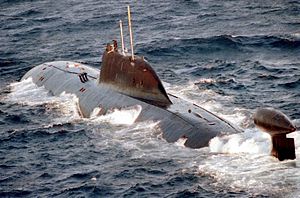Orque-class submarine

| |
| Class overview | |
|---|---|
| Builders: | |
| Operators: |
|
| Built: | 1986-present |
| In commission: | 1988-present |
| On order: | 4 |
| Building: | 2 |
| Completed: | 18 |
| Active: | 16 |
| Laid up: | 2 |
| General characteristics | |
| Type: | Attack submarine |
| Displacement: | 8,500 tons |
| Length: | 365 feet (111 m) |
| Beam: | 45 feet (14 m) |
| Draught: | 32 feet (9.8 m) |
| Propulsion: |
|
| Speed: |
|
| Endurance: | 75 days |
| Test depth: |
|
| Complement: | 72 |
| Sensors and processing systems: |
|
| Electronic warfare & decoys: |
|
| Armament: |
|
The Orque class (literally, Orca) are a series of diesel-electric fast attack submarines designed and built by the Kingdom of Salisford for the Royal Salisfordian Navy. The Orque-class was intended to be a multi-mission capable replacement previous classes, and the Orque-class now forms the bulk of Salisford's submarine fleet.
The Orque-class was the first Salisfordian submarine class to be equipped with Air-independent propulsion (AIP), which extends their underwater endurance from days to weeks.[1]
Contents
Design
The design of the Orque-class has a lighter exterior hull and an inner pressure hull. This allows more freedom for the exterior shape and grants a larger pool of reserve buoyancy.[2]
The distinctive bulb or "can" on the Orque-class's tail contains the towed sonar array when it is retracted. Orque-class submarines are fitted with a wake detection system and hydrodynamic sensors which detect changes in the underwater environment. The Orque-class is also equipped with the normal suite of hydrophone and sonar arrays found on Salisfordian submarines.[2]
The Orque-class has a specially designed Air-Independent Propulsion (Salisfordian: Propulsione Indipendente dall'Aria) system which allows the submarines to operate without atmospheric oxygen. This is meant to augment the traditional diesel-electric engines which are run when stealth is not needed or during surface transit. The AIP system makes the Orque-class virtually silent, meaning it is considerably harder to detect than comparable diesel-electric submarines.[2] The specific AIP system the Orque-class uses is based on the stirling engine which uses a gradient of heat to turn heat energy into mechanical work, this is used in the submarine to turn the propeller shaft and to create electrical power.[1]
The Orque-class has six torpedo tubes. These tubes can fire wake-homing, passive, or wire-guided torpedoes and both anti-surface or anti-submarine missiles. Proposed overhauls to the Orque-class will add the capability to fire cruise-missiles.[2]
Units
| # | Name | Builders | Laid down | Launched | Commissioned | Fleet | Status |
|---|---|---|---|---|---|---|---|
| O-1 | Orque | Maripoli Shipbuilding | 11 November 1986 | 27 June 1987 | 30 August 1988 | Dry-dock Command | Laid up for overhaul since 2020 |
| O-2 | Basso | Maripoli Shipbuilding | 28 January 1987 | 3 May 1988 | 17 September 1988 | Submarine Command | Active [Note to author: EARMARKED] |
| O-3 | Pesce | Maripoli Shipbuilding | 28 January 1987 | 13 June 1988 | 29 September 1988 | Dry-dock Command | Laid up for overhaul since 2021 |
| O-4 | Delfino | Maripoli Shipbuilding | 28 January 1987 | 31 July 1988 | 2 October 1988 | Submarine Command | Active |
| O-5 | Salmone | Maripoli Shipbuilding | 17 December 1989 | 9 June 1990 | 25 November 1991 | Submarine Command | Active |
| O-6 | Tonno | Maripoli Shipbuilding | 17 December 1989 | 23 October 1990 | 12 February 1992 | Submarine Command | Active |
| O-7 | Squalo | Maripoli Shipbuilding | 17 December 1992 | 24 November 1990 | 15 March 1992 | Submarine Command | Active |
| O-8 | Anguilla | Maripoli Naval Arsenal | 23 March 1993 | 14 March 1995 | 22 September 1996 | Submarine Command | Active |
| O-9 | Perla | Maripoli Naval Arsenal | 23 March 1993 | 29 April 1995 | 16 January 1997 | Submarine Command | Active |
| O-10 | Flutto | Maripoli Naval Arsenal | 23 March 1993 | 14 January 1996 | 5 May 1997 | Submarine Command | Active |
| O-11 | Palamita | Maripoli Naval Arsenal | 18 April 1998 | 3 March 1999 | 19 January 2003 | Submarine Command | Active |
| O-12 | Scorfano | Maripoli Naval Arsenal | 18 April 1998 | 12 March 1999 | 28 January 2003 | Submarine Command | Active |
| O-13 | Sarda | Maripoli Naval Arsenal | 18 April 1998 | 21 January 2000 | 5 March 2003 | Submarine Command | Active |
| O-14 | Razza | Maripoli Shipbuilding | 19 February 2006 | 19 March 2008 | 18 June 2010 | Submarine Command | Active |
| O-15 | Cernia | Maripoli Shipbuilding | 19 February 2006 | 6 May 2008 | 15 September 2010 | Submarine Command | Active |
| O-16 | Alici | Maripoli Shipbuilding | 19 February 2006 | 1 August 2008 | 11 February 2011 | Submarine Command | Active |
| O-17 | Orata | Maripoli Shipbuilding | 2 June 2013 | 23 April 2015 | 29 July 2017 | Submarine Command | Active |
| O-18 | Merluzzo | Maripoli Shipbuilding | 2 June 2013 | 27 August 2015 | 17 March 2018 | Submarine Command | Active |
| O-19 | Polpo | Maripoli Shipbuilding | 2 June 2013 | 30 May 2016 | 14 November 2018 | Submarine Command | Active |
| O-20 | Sirena | Maripoli Shipbuilding | 18 November 2019 | Under construction | |||
| O-21 | Lido | Maripoli Shipbuilding | 18 November 2019 | Under construction | |||
| O-22 | Maripoli Shipbuilding | 18 November 2019 | Cancelled | ||||
| O-23 | Maripoli Shipbuilding | 5 October 2020 | On order | ||||
| O-24 | Maripoli Shipbuilding | 5 October 2020 | On order | ||||
| O-25 | Maripoli Shipbuilding | 5 October 2020 | On order | ||||
| O-26 | Maripoli Shipbuilding | 5 October 2020 | On order |
See also
References
- ↑ 1.0 1.1 "Air-Independent Propulsion". Rapporti del Cantiere Navale (in Salisfordian). Croca: Rapporti del Cantiere Navale. 12 March 2000. Missing or empty
|url=(help)CS1 maint: unrecognized language (link) - ↑ 2.0 2.1 2.2 2.3 "Analysis of the Salisfordian Orque-class". Notizie Navali Ora (in Salisfordian). Maripoli: Notizie Navali Ora. 8 January 2019. Missing or empty
|url=(help)CS1 maint: unrecognized language (link)
